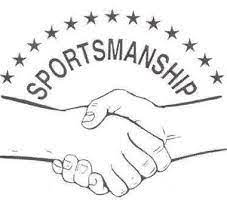Week 9 - Sportsmanship
This week, we talked about the importance of sportsmanship in life.
By virtue of being IITians, all of us in this class have had fairly upwards trajectories in our life so far. However, we cannot expect the same to continue indefinitely; there will be tough periods when we are going through a rough patch, or a gamble we take doesn't work out.
Life is a journey, and what matters is how far we go, not how fast we move. One needs to be able to withstand setbacks and be rational with self doubt to be able to take on this journey effectively. That is why sportsmanship is important.
One of the most important aspects of being a good sport is focusing on the process. This must not be confused with not having a goal; a goal is crucial to have direction in life and our work. What this means is that we must not be focused on the outcomes, but rather on putting in our best efforts and extracting the most value from our experiences.
Life is strange; our needs and wants constantly change. If we focus only on the goal, we are making an invalid assumption that we have full control over life. This makes us worried and panicked whenever things don't go as planned. On the other hand, a person who focuses on their effectiveness alone will be able to savour the process and find beauty in the mysterious ways life works out.
A person whose primary goal is to live life to the fullest is motivated by their interest in their work, the only thing they can control. They are independent of external motivating factors like money or fame, which is out of their control. As their focus is not on the immediate goal, they have a clearer idea of the bigger picture, unfazed by recent success or setbacks.
In professional environments too, this attitude helps more than talent. A professional environment is filled with setbacks, and one who can learn from that and move on will be better valued over a person with raw talent but a bad attitude.
Building Sportmanship
Most people suffer from some deal of attribution error; when we achieve some success, we attribute it solely to ourselves, and when we are dealing with failure, we blame external factors, such as bad luck or poor co workers. Truth is, in any situation, a mix of internal and external factors determine success and failure. A person who is a good sport can rationally correct their attribution bias, expressing gratitude towards factors that played a part in their success, and analyzing what they could have done better in case of failures. Taking conscious effort to do so can help us feel gratitude and improve as a person.
Often, selfish behaviour or pressure to succeed comes from a belief that 'the pie is limited'. If we do not act fast enough, or help others, then we feel we will be beaten in the race to a slice of this pie. This has never been true. In all of history, human prosperity has only increased, and it is continuing to do so, aided by technology, at a pace never before seen. To develop a sporting attitude, rather than thinking about racing to a slice of the pie, we need to ask ourselves how can we contribute to expanding the pie.
One of the biggest stumbling blocks to a sporting mindset, is envy and jealousy. It is tough to remain calm and composed when you are having a tough time, but we see others succeeding and having a good time.
To overcome this, it is important that we understand that everyone has different strengths and battles to face. While we see their success, we do not see the fortune or struggle behind it. We must realise that people are on different timelines; some may strike gold faster than others, but there is no need to feel worried as long as your own work is effective.
Last but not least, to build sportsmanship, we must hold ourselves in high esteem. If we are not confident about ourselves, we will tend to constantly look over our shoulder. The mark of a truly sporting person is one who can praise others for their success wholeheartedly, detaching their ego from the moment.
This session was a much needed alert for me. I was not proud of my academic situation, and was looking at others who were doing well, wondering what I was missing. In essence, I was on a mental downward spiral. This session made me realise that my own battles were completely different from these people I was looking up to, and it was natural that the results were different. By trying to chase them out of envy, I was only scattering my energy, often into inefficient pursuits. Instead, I needed to keep my head down, remind myself of my good fortune, not worry too much about my grades, and direct my mental energy into doing the best work I can. I may look up to others, but the only person I need to be competing with is myself.





Comments
Post a Comment